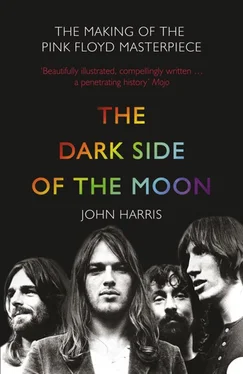‘With Syd’s very clear mental problems,’ says Peter Jenner, ‘there was a sense of, “Well, is it our fault or his? Who’s actually mad: him or the rest of us? Is the madman speaking truth?” For someone like me, who was quite young and pretentious and intellectual and read too many books, it was very hard to cope with. We knew something was a bit weird, but on the other hand, the Floyd’s whole experience had been a bit weird. We were out there on the edge, so what was wrong with Syd being a bit out there on the edge? At what point does being original and new and different become loony? It seemed impossible to say. It’s a continuum.’
On one occasion, Barrett’s colleagues arranged for him to meet Laing, only for Syd to decide at the last moment that he was unwilling to go through with it. ‘He wouldn’t get out of the car,’ says Roger Waters, who accompanied Barrett to Laing’s house. ‘And I’m not sure that was necessarily a bad thing. Laing was a mad old cunt by then. [Pause] Actually, “cunt” is a bit strong. But he was drinking a lot.’
Contrary to the fashionable thinking of the time – and in keeping with his distanced relationship with the Underground – Waters claims to have held fast to a conventional diagnosis of Barrett’s problems. ‘Syd was a schizophrenic,’ he says. ‘It was pretty clear to me that that was what was the matter with him. But not everybody would accept that. I had ties with Syd’s family going back a fair way, and I can remember telephoning one of Syd’s brothers and telling him he had to come and get Syd, because he was in a terrible mess, and he needed help. And the three of us sat there, and in effect, Syd did a fairly convincing impression of sanity. And his brother said, “Well, Roger says Syd’s ill, but that’s not the way it seems to me.”
‘There was eventually a lot of argy-bargy with his family, and a lot of stuff about whose fault it was,’ says Waters. ‘His mother blamed me entirely for Syd’s illness. I was supposed, I think, to have taken him off to the fleshpots of London and destroyed his brain with drugs. And the fact is, I never had anything to do with drug-taking. Certainly not with Syd, although he did indulge in lots of acid, which given the fact that he was an incipient schizophrenic was obviously the worst possible thing in the world for him. But mothers have favourite sons – and if something goes wrong, they have to find someone to blame.’
Barrett’s decline took place against the backdrop of frantic activity: the aforementioned US tour, a run of British shows with The Jimi Hendrix Experience and The Nice, and attempts to record a new single, so as to capitalize on the success of both ‘See Emily Play’ and The Piper at the Gates of Dawn . The fact that Barrett was able to honour the vast majority of his commitments seems faintly miraculous, although his behaviour was leading to snowballing tension within the group. While Waters, Mason and Wright would attempt to found the band’s shows on at least some sense of structure, Barrett was prone to perpetrating musical anarchy, regularly detuning his guitar, and frequently proving reluctant to sing. For at least one show on the Hendrix tour, he could not even be persuaded to take the stage: so it was that David O’List, The Nice’s guitarist, was cajoled into temporarily taking his place.
‘We were irritated,’ says Nick Mason. ‘There was a tendency to tut: a lot of “Oh God ”. And to some extent, we ignored it. That’s the way I remember it: there wouldn’t have been a big row in the dressing-room. There was never any confrontation: it was very much, “Let’s avoid confrontation at all costs – for God’s sake, let’s try and pretend everything’s all right. Let’s not have a crisis. Maybe things will be all right if we just keep them going.” I think that’s a peculiarly English thing anyway. But we didn’t have those sorts of skills in terms of … [pause] human resources.
‘On any given night, we had no idea what was going to happen. And it wasn’t like every gig, or every song, being a disaster. I don’t remember being onstage thinking, “Here we go again.” Each time, it was a surprise.’
In the recording studio, the impossibility of Barrett’s position was increasingly evident. By way of a new single, he came up with ‘Apples and Oranges’: in Roger Waters’s view, ‘a fucking good song … destroyed by the production.’ In fact, it amounted to a loose-ended sketch that might conceivably have been honed into shape had its author not been in such a fragile state. The band’s public certainly thought as much: though EMI was desperately hoping for a third hit, ‘Apples and Oranges’ stiffed.
The run of sessions that produced that song also gave rise to three other Barrett-authored tracks, all of which attested to his decline. On ‘Jugband Blues’, a song that teetered on the brink of collapse before being suddenly and inexplicably invaded by a Salvation Army band, he came close to expressing a chronic sense of self-alienation (‘I’m not here … And I’m wondering who could be writing this song’). ‘Scream Thy Last Scream’, on which Barrett was accompanied by a speeded-up, inescapably irritating backing vocal, was eventually all but subsumed – for some reason – by a cacophony of audience noise. Perhaps most telling of all was a song called ‘Vegetable Man’. If its lyrics superficially suggested a self-deprecating joke, it also betrayed a palpable sense of self-loathing, only accentuated by the churning, discordant music that made up its backing track.
On all four songs, the sense of inspired exploration that had been the hallmark of The Piper at the Gates had evaporated. Now, it seemed, Pink Floyd were simply tumbling into chaos.
By the end of 1967, Pink Floyd (the ‘The’ would continue to crop up on posters and handbills until mid-1969, though its use was evidently on the wane) was at an unenviable career juncture. It was clear that Barrett’s role was untenable; and yet the group’s management was adamant that a future without his creative input was inconceivable. The one Roger Waters composition released thus far was ‘Take Up Thy Stethoscope and Walk’, a musical makeweight that amounted to Piper ’s one glaring flaw; Rick Wright had contributed ‘Paintbox’, as the B-side of ‘Apples and Oranges’ – the breezy tale of a night on the town that was so lacking in any of the group’s customary experimentalism that it skirted dangerously close to the dread category of Easy Listening.
To Peter Jenner and Andrew King, all this amounted to clear evidence that Barrett had somehow to be kept in the band. Waters, however, was adamant that he had to leave. ‘Roger was the leader of the “Syd Must Go” faction,’ says Peter Jenner. ‘He was saying, “We can’t work with this guy any more. It’s impossible for us to go to a gig and have him turn up, or not turn up, and not give us a set list – it’s making us look like prats.” He was out there on the frontline, whereas I was back in the office being intellectual about it. But he was aware that they were killing their career by doing these gigs with Syd, because they were turning off the punters. It was a complete mess. And I think the worst thing was the demand for another record, when there were no songs coming from Syd. It was, “What the fuck are we going to do?” But the Syd faction – myself and Andrew – had no confidence in any of them writing without him.’
By way of a compromise, it was suggested that the group should recruit a second guitarist, leaving Barrett to appear as and when he was in sufficiently good shape, and continue to write the group’s songs. They thus made renewed contact with an old acquaintance from their days in Cambridge: David Gilmour, then making frustratingly little headway in a London-based trio called Bullitt. He accepted the offer of a new job, he later recalled, largely thanks to the prospect of ‘fame and the girls’. On the former count, at least, he did not get off to the most promising start. By the time of the announcement of his recruitment in the music press, the group’s stock had so fallen that the story was not exactly headline news: the NME gave it one small paragraph, and spelled the new member’s surname ‘Gilmur’.
Читать дальше












